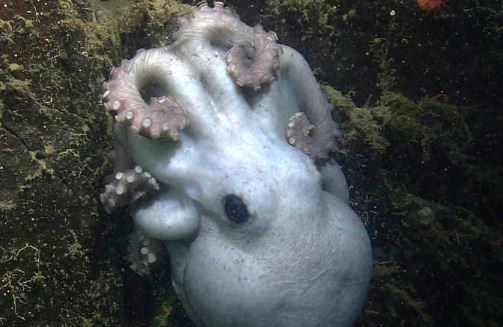An octopus in the deep sea was observed brooding its eggs for four-and-a-half years, longer than any other known animal, a paper published on Wednesday in the Public Library of Science, or PLOS ONE, revealed.
Scientists at the Monterey Bay Aquarium Research Institute found a female octopus 4600 feet below the ocean surface clinging to a rocky ledge while guarding a clutch of eggs in May 2007.
Most shallow-water octopuses protect their eggs for 1-3 months, according to the paper by MBARI biologist Bruce Robison and two former MBARI post-docs. But in the deep ocean’s cold, dark waters, the metabolic process slows dramatically.
Using a remotely operated vehicle (ROV), the team found the Graneledone boreopacifica 4,600 feet deep. In April 2007, they saw the pale purple octopus creeping across the sediment; a month later she was guarding a clutch of eggs on a rocky ledge.
The team returned 18 times over the next four and a half years. “Each time…we found the same octopus clinging to the vertical rock face, arms curled, covering her eggs,” the paper states.
The researchers found no evidence the octopus ate while brooding. She pushed away crustaceans within her reach and ignored chunks of crab offered by the ROV.
After the initial sighting, Robison made a habit of checking in on her, according to MBARI spokeswoman Judith Connor.“He started saying, ‘Wow, let’s see if she’s still there,’” she says.
The ROV sends live video by cable to a control station on the MBARI vessel, where pilots control the robot.
The bigger goal, Connor says, is to study how ocean acidification is affecting marine life.
Agencies/Canadajournal
 Canada Journal – News of the World Articles and videos to bring you the biggest Canadian news stories from across the country every day
Canada Journal – News of the World Articles and videos to bring you the biggest Canadian news stories from across the country every day



